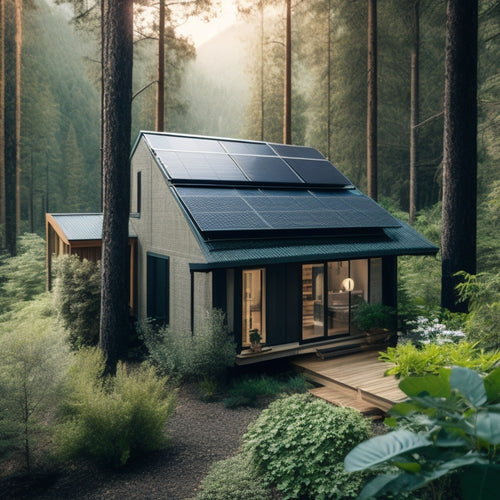
Top Off-Grid Solar Power Systems for Homes
Share
You're looking for a reliable off-grid solar power system for your home. You can choose from top-rated systems featuring high-efficiency panels from brands like SunPower, Panasonic, and LG. Combine these with reliable inverters, durable deep cycle batteries, and efficient charge controllers for a seamless setup. When sizing your system, consider your daily energy demands and choose from small to extra-large systems. Don't forget to plan for proper installation, maintenance, and potential upgrades. As you explore these essential components, you'll discover the perfect off-grid solar power system tailored to your energy needs and budget.
Key Takeaways
• Choose high-efficiency solar panels from reputable brands like SunPower, Panasonic, and LG for optimal energy harvesting.
• Select the right inverter technology, such as string, micro, or power optimizers, based on your system's specific needs and efficiency goals.
• Match your off-grid system size to your daily energy demands, considering small, medium, large, or extra-large options to ensure reliable power supply.
• Ensure efficient energy storage with deep cycle batteries, selecting from FLA, AGM, or Gel Cell types, and considering maintenance and feature requirements.
• Opt for a cost-effective system package that balances energy consumption, roof space, and budget, with flexibility for future upgrades and component additions.
Best Off-Grid Solar Panel Brands
When selecting an off-grid solar power system for your home, the quality of the solar panels themselves is vital, and opting for a reputable brand can greatly impact the overall performance and longevity of your system. You want to make sure that your solar panels can withstand harsh weather conditions and generate consistent power output over their lifetime.
To achieve this, it's important to choose a brand with a proven track record of delivering high-quality solar panels. Look for brands that have been certified by reputable organizations, such as UL (Underwriters Laboratories) or IEC (International Electrotechnical Commission). These certifications ensure that the solar panels meet rigorous standards for safety, performance, and durability.
Some of the top off-grid solar panel brands to take into account include SunPower, Panasonic, and LG. These brands are known for their high-efficiency solar panels, durable construction, and excellent warranty programs.
Top Rated Off-Grid Inverters
When selecting an off-grid inverter for your home, you need to evaluate the type of technology used and its efficiency rating.
You'll want to compare different inverter technologies, such as modified sine wave, pure sine wave, and quasi-sine wave, to determine which one best suits your energy needs.
Inverter Technologies Compared
You'll likely encounter several inverter technologies when selecting an off-grid solar power system, each with its strengths and weaknesses. The choice of inverter technology depends on your specific energy needs and grid resiliency requirements. Here's a comparison of three top inverter technologies:
| Inverter Technology | Grid Resiliency | Inverter Upgradability |
|---|---|---|
| String Inverters | Medium | Easy |
| Microinverters | High | Difficult |
| Power Optimizers | High | Moderate |
String inverters are a cost-effective option, but may not provide the same level of grid resiliency as microinverters or power optimizers. Microinverters, on the other hand, offer high grid resiliency but are more expensive and difficult to upgrade. Power optimizers strike a balance between the two, providing high grid resiliency and moderate upgradability. When selecting an inverter technology, consider your energy needs, budget, and future upgrade requirements. By understanding the strengths and weaknesses of each technology, you can make an informed decision for your off-grid solar power system.
Inverter Efficiency Ratings
As you evaluate the advantages and disadvantages of different inverter technologies, it's vital to take into account the efficiency ratings of top-rated off-grid inverters, which can greatly impact your system's overall performance and energy yield. A higher efficiency rating translates to more energy harvested from your solar panels, ultimately leading to Grid Parity – a pivotal milestone in achieving energy independence.
When selecting an off-grid inverter, look for high-efficiency models with ratings above 95%. Leading brands like Schneider Electric and OutBack Power offer inverters with efficiency ratings up to 97%. These high-efficiency inverters minimize energy losses, ensuring you get the most out of your solar panels.
Additionally, they often come with advanced features like maximum power point tracking (MPPT) and built-in monitoring capabilities, further optimizing energy harvesting.
Deep Cycle Battery Options
As you consider off-grid solar power systems for your home, selecting the right deep cycle battery is essential. You'll need to choose from a range of battery types, each with its own strengths and weaknesses, and consider factors like depth of discharge, cycle life, and maintenance requirements.
Battery Types Compared
When selecting a deep cycle battery for your off-grid solar power system, it's essential to consider various options available. Flooded Lead-Acid (FLA) batteries, Absorbed Glass Mat (AGM) batteries, and Gel Cell batteries are three popular choices. Each type has its unique characteristics that impact performance and maintenance requirements.
FLA batteries, known for being the most cost-effective option, require regular maintenance. They can be heavy and bulky, which may affect their practicality depending on the setup. AGM batteries, in contrast, offer a maintenance-free experience and are spill-proof, making them a convenient choice. However, they tend to be more expensive upfront.
Gel Cell batteries strike a balance between FLA and AGM batteries, providing reliability and low maintenance. When considering the safety of Lithium-ion batteries, ensure that the manufacturer has implemented robust safety features to prevent potential hazards. For Gel Cell batteries, prioritizing reliability is crucial, so opt for manufacturers that offer performance guarantees.
Understanding the strengths and weaknesses of each type of battery will help you make an informed decision for your off-grid solar power system. By evaluating factors such as cost, maintenance requirements, efficiency, and safety features, you can select the deep cycle battery that best suits your needs.
Deep Cycle Options
You'll find that deep cycle battery options for off-grid solar power systems can be broadly categorized into two main types: flooded batteries and valve-regulated lead-acid (VRLA) batteries. Flooded batteries, also known as wet batteries, require regular maintenance to ensure peak performance. They're more affordable upfront but require more upkeep.
VRLA batteries, on the other hand, are sealed units that are low-maintenance and more expensive initially. When selecting a deep cycle battery, consider your power needs, available space, and budget. If you're looking for a reliable option with longer cycle life, consider battery upgrades like lithium-ion or advanced lead-acid batteries. These upgrades offer improved performance and longer lifetimes.
Cycle testing is important to determine the battery's capacity and lifespan. It's vital to choose a battery that meets your specific needs and guarantees a reliable off-grid solar power system. By understanding the characteristics of each option, you'll be better equipped to make an informed decision for your home's energy needs.
Battery Maintenance Tips
Proper maintenance is crucial to extending the lifespan of your deep cycle battery, and you should perform regular checks to guarantee peak performance. This includes monitoring the battery's state of charge, voltage, and temperature. You should also guarantee proper cell balancing, which involves equalizing the charge of individual cells to prevent overcharging or undercharging. This helps to maximize the battery's lifespan and prevent premature failure.
| Maintenance Task | Frequency | Importance |
|---|---|---|
| Check electrolyte levels | Monthly | High |
| Monitor voltage and temperature | Weekly | High |
| Perform cell balancing | Quarterly | Medium |
| Clean terminals and connections | Bi-Monthly | Low |
Charge Controllers for Homes
An essential component of an off-grid solar power system, the charge controller regulates the flow of energy from the solar panels to the battery bank, guaranteeing efficient and safe charging.
As you design your home's off-grid solar power system, selecting the right charge controller is vital. You'll want a controller that can handle the maximum power point tracking (MPPT) of your solar panels, ensuring you're getting the most out of your solar energy.
Look for a controller with advanced features like home automation capabilities, allowing you to monitor and control your energy usage remotely. Some high-quality charge controllers even integrate with energy monitoring systems, providing you with real-time data on your energy production and consumption.
With this information, you can optimize your energy usage, reduce waste, and maximize your energy independence. When choosing a charge controller, consider factors like compatibility, efficiency, and durability to guarantee a reliable and efficient off-grid solar power system for your home.
Monocrystalline Vs Polycrystalline Panels
When designing your off-grid solar power system, selecting the right type of solar panel is essential, and the choice between monocrystalline and polycrystalline panels depends on factors such as efficiency, cost, and durability.
Monocrystalline panels boast higher panel efficiency, typically ranging from 15% to 20%, making them a popular choice for off-grid systems where space is limited. They also have a sleeker, darker appearance, which may appeal to homeowners who prioritize solar aesthetics. However, their higher cost and lower temperature tolerance may be drawbacks for some users.
Polycrystalline panels, on the other hand, offer a more affordable option with slightly lower efficiencies, typically ranging from 12% to 15%. While they may not be as efficient, they're more budget-friendly and can still provide reliable performance. Their blue-gray hue may not be as visually appealing, but they're a great option for those on a tighter budget.
Ultimately, you'll need to weigh the pros and cons of each option based on your specific needs and priorities. Consider factors like available roof space, budget, and desired appearance to make an informed decision.
Off-Grid System Sizing Guide
Considering the complexity of your energy demands is crucial when sizing your system. It is vital to take into account factors such as your daily energy requirements, the amount of sunlight your location receives, and the type of batteries you'll use for energy storage.
When sizing your system, it is imperative to contemplate the complexity of your energy demands. Will you be powering only lights and laptops, or will you also need to run refrigeration units and air conditioning systems? The more energy-intensive your appliances, the larger your system will need to be.
Here's a rough guide to help you get started:
| System Size | Daily Energy Demands | System Complexity |
|---|---|---|
| Small (1-2 kW) | 10-20 kWh/day | Simple (lights, laptops, TVs) |
| Medium (2-5 kW) | 20-40 kWh/day | Moderate (small appliances, refrigeration) |
| Large (5-10 kW) | 40-80 kWh/day | Complex (large appliances, AC systems) |
| Extra Large (>10 kW) | >80 kWh/day | Very Complex (heavy industrial use) |
DIY Installation Tips and Tricks
You'll need to carefully plan and prepare your installation site before starting the DIY installation of your off-grid solar power system. Guarantee a safe working environment by wearing personal protective equipment, such as gloves and safety glasses, and maintaining a clean and clear workspace. Solar Safety is a top priority, so be mindful of electrical shock hazards and take necessary precautions to avoid accidents.
When it comes to wiring, utilize Wiring Hacks to simplify the process. Use color-coded wires to differentiate between positive and negative connections, and consider using a wiring diagram to visualize your system's electrical layout. Labeling your wires and components will also help you stay organized and reduce the risk of errors.
When mounting your solar panels, make sure they're securely fastened to the roof or ground-mounted rack to withstand environmental stresses. Properly secure all electrical connections and use weather-tight fittings to protect your system from the elements.
Off-Grid System Maintenance Tips
With your off-grid solar power system up and running, regular maintenance is key to ensuring peak performance and extending the lifespan of your equipment. You'll want to perform routine system inspections to identify and address any potential issues before they become major problems. This includes checking the condition of your solar panels, batteries, and electrical connections to make sure they're clean, secure, and functioning correctly.
Energy monitoring is also essential to maintaining your off-grid system. By keeping track of your energy production and consumption, you can identify areas for improvement and make adjustments to optimize your system's performance.
This might involve adjusting your energy usage habits, upgrading your equipment, or simply ensuring that your system is properly sized for your needs.
Cost-Effective System Packages
Four cost-effective system packages are available to suit different off-grid solar power needs, each carefully designed to provide a reliable and efficient energy solution for your home. These packages cater to various energy requirements, ensuring you find the perfect fit for your off-grid lifestyle.
When selecting a package, consider your energy consumption, available roof space, and budget. You'll appreciate the flexibility of our system design, which allows you to upgrade or modify your system as your energy needs evolve.
Our package deals include everything you need to get started, from high-efficiency solar panels to advanced inverters and durable mounting systems.
Frequently Asked Questions
Can I Use Off-Grid Solar Power With a Septic System?
You can definitely use off-grid solar power with a septic system, but it's important to prioritize Septic Maintenance and Water Conservation to avoid overloading the system and establish a sustainable, eco-friendly setup that benefits your wallet and the environment.
Are Off-Grid Solar Systems Suitable for Areas With Frequent Power Outages?
Like a captain steering through treacherous waters, you're seeking refuge from frequent power outages. Off-grid solar systems are a beacon of hope, offering grid independence and reliability, especially in areas plagued by outage frequency, where traditional grid reliability is as fleeting as a sunset.
Do Off-Grid Systems Require a Backup Generator for Cloudy Days?
You'll find that off-grid systems typically don't require a backup generator for cloudy days, thanks to energy storage solutions with sufficient battery capacity, which can provide power when the sun isn't shining.
Can I Expand My Off-Grid System if My Energy Needs Increase?
As your energy demands increase, you can expand your off-grid system through system upgrades, such as adding more solar panels or batteries, to guarantee your energy needs are consistently met without sacrificing reliability.
Are Off-Grid Solar Systems Compatible With Well Water Systems?
You'll be pleased to know that off-grid solar systems can seamlessly integrate with well water systems, enabling efficient water pumping and promoting water conservation, ensuring a sustainable and reliable water supply.
Related Posts
-

Top Portable Refrigerators for Camping Adventures
When you're camping, having a reliable portable refrigerator can make all the difference for keeping your food fresh ...
-

Off Grid Solar Batteries
As you shift to off-grid living, you'll rely on high-performance solar batteries to store excess energy generated by ...
-

Top Solar Powered Camping Fans for Camping Enthusiasts
If you're a camping enthusiast, a solar-powered fan can be a transformative element for your outdoor experience. Thes...


